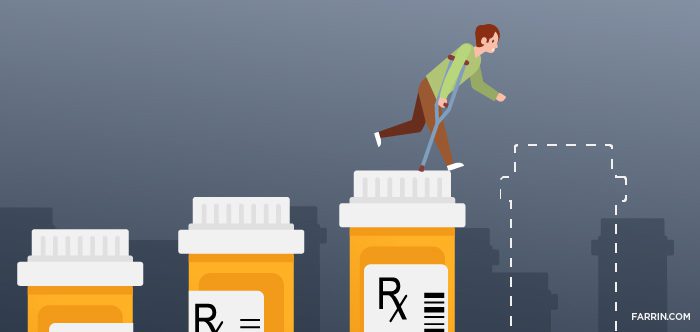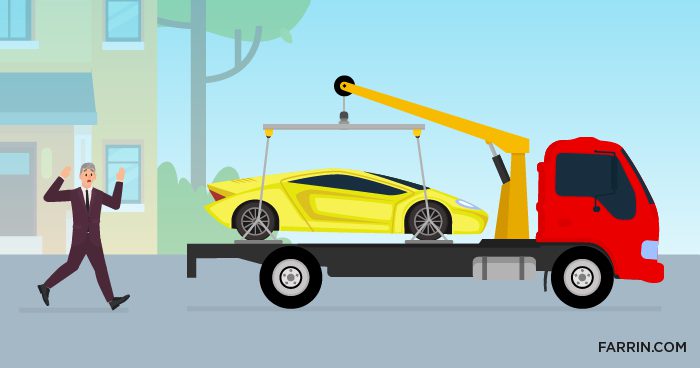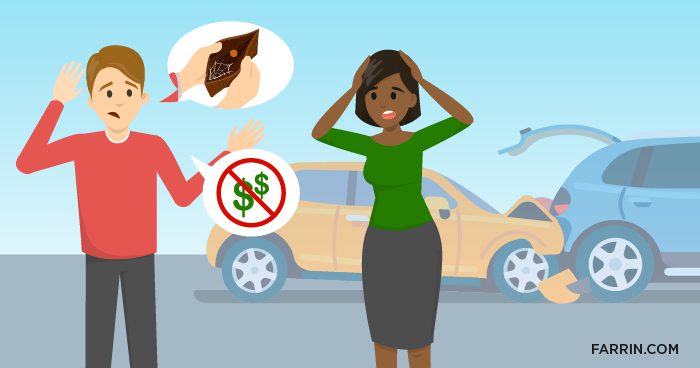What happens when a millionaire gets behind the wheel while drunk or texts while driving and hits you, but only has minimal insurance coverage that doesn’t even cover all your medical bills?
It’s not fair. That’s why, in situations like these, your attorney can sue the other driver and go after “recreational assets,” like large savings accounts, extra cars, fancy boats, or vacation homes. Basically, the court says if the at-fault driver has the extra money to own these things, they can pay for the damages they’ve caused you.
But because the courts also don’t want everyone to go “lawsuit crazy,” the process can be long and arduous, and we don’t recommend trying it without an experienced car accident lawyer.
How Do Insurance Policy Limits Work?
For many people, the greatest obstacle in seeking compensation from car accident insurance companies following an accident is the insurance adjuster. That’s because they represent the insurance company, and for-profit companies make more profit by paying out less money.
But sometimes, the adjuster is not what’s standing in the way of full recovery. Every policy has a limit of maximum liability for the insurance company. Even if the adjuster authorizes maximum compensation, your car accident injuries may still cost more than what’s available under the at-fault driver’s insurance policy.
How Often Do Auto Accident Settlements Exceed the Insurance Policy Limits?
Auto accident settlements based on a single policy are highly unlikely to exceed the insurance policy limits because the insurance company is highly unlikely to agree to a settlement above what they’re contractually obligated to pay.
But what happens when your car accident injury claim exceeds insurance limits? What if your accident resulted in serious injuries and the harms and losses you have suffered are significant? Do you have any recourse? Thankfully, the answer may be yes.
I’ll go into more detail below, but here are some avenues you may be able to pursue if your car accident injury claims exceed the at-fault driver’s insurance policy limits:
-
- You can file a lawsuit to seek damages in excess of the insurance policy limits.
-
- You can research to see if the at-fault driver has “umbrella” coverage or separate coverage on another vehicle as well.
-
- You can investigate the possibility of recovering under multiple defendants’ insurance policies.
Car accidents can be very complicated cases, and I encourage you to talk to an experienced personal injury attorney when determining your course of action. My firm will give you a free case evaluation.
How Do Insurance Policy Limits Affect Settlements?
While the insurance company will not cover anything above liability insurance policy limits, it’s possible the driver has more than just basic driver’s insurance. They may also have a secondary “umbrella policy,” which is intended to cover excess damages not covered under the main policy’s limits.
Umbrella coverage effectively increases policy limits in many situations and increases the pool of money available in a potential settlement. This additional coverage may certainly factor in possible settlement discussions with the insurance company – if you know the defendant has it.
While umbrella policies tend to be associated with business and corporate defendants, others can have them too. It all comes down to knowing what to look for. Don’t count on the insurance company to tell you of any coverage for excess damages. You want someone in your corner who knows the ins and outs of insurance policy coverages.
How Do You Find Out If Someone’s Policy Limits Are Enough to Cover an Accident?
Knowing if someone’s policy limits are enough to cover an accident can be very useful as you contemplate your settlement demands. If it works, the best solution to discovering the at-fault driver’s policy limits is simply to ask the other driver to see if they’ll provide the information. If they have been instructed not to talk to you by their adjuster, try asking the adjuster. However, insurance companies are not generally required to disclose policy limits in liability claims upon request.
In the event you file a lawsuit to pursue full compensation, policy limits information will come to light as part of the litigation process. In some circumstances, you may be able to compel disclosure of policy limits prior to filing a lawsuit by sending the insurance company a demand letter.
However, you must meet certain conditions and jump through hoops for this demand to have legal effect. To determine the best course of action for you based on the unique facts of your case, consult a skilled car accident attorney.
Can I Sue for More Than the Insurance Policy Limits?
Before your attorney can sue the at-fault driver for their assets, you must first go through litigation and a trial. If you win, and the jury awards a verdict in your favor, the insurance company will have to pay. However, the insurance company can only pay what it is under contract to pay (the policy limits), and no more.
If a jury agrees that you should be awarded more than the insurance company’s policy limits can cover, that award is known as an “excess verdict.” The excess verdict is what is owed to you above the limits the insurance company is contracted to pay.
Let’s say, for example, the at-fault driver has a $100,000 policy limit contracted with their insurance company, but your damages total $170,000. The insurance can only pay up to $100,000. That additional $70,000 would fall under the “excess verdict” the jury awarded.
It is only with an excess verdict that you can sue for personal property to try to bridge the gap between what the jury awarded you and what the insurance company paid.
Many people buy auto insurance policies with limits high enough to protect their personal assets. However, in the event of serious injuries, an attorney may seek an excess judgment if there isn’t enough insurance available to cover current and future medical bills. This is particularly true if the at-fault party has significant assets that could satisfy the judgment.
What Properties and Assets Can Be Seized?
When auto insurance policy limits are not enough and you are awarded an excess verdict, the at-fault driver has legal rights to protect certain property by claiming exemptions. Moreover, do not be deceived into thinking that just because you successfully sue someone for their property, you will get paid right away. That would be too easy!
Exempt property must fall under certain legal definitions. It includes things like the primary home the at-fault driver owns and lives in, as well as their primary vehicle.
For other non-essential property, like a vacation home, the judgment must be filed in every county where the defendant owns real property. And because the at-fault driver cannot be forced to sell their real estate to pay you right away, that judgment must be renewed every 10 years.
The judgment gives you a lien on the property, and when it is voluntarily sold, then the judgment can be paid. It is also worth noting that the judgment does not have priority. It is paid after other lienholders, such as the mortgage company.
If there are other assets that are easier to sell, like trucks, cars, or boats, then the local sheriff can execute the judgment and seize those assets. But you won’t get the full amount of the proceeds. The sheriff is entitled to a percentage of what is made on the sale of those assets.
As each case is unique and must be evaluated on its own merits, you can undoubtedly begin to see there are many good reasons why to hire a car accident lawyer experienced in personal injury litigation.
What to Do If the At-Fault Driver Has Low Insurance Policy Limits
Many drivers in the Carolinas carry only the minimum required liability insurance policy. Medical costs can easily exceed those limits, especially in a car accident involving serious injuries. So how do you make up the difference between their policy and your medical bills?
As discussed, suing is one option. Whether or not you can find success by suing the at-fault driver largely depends on the negligent driver actually having any money. If they have empty pockets, you may not collect much no matter the size of awarded damages, garnished wages, or property liens.
Another option is trying to recover from other parties to the case. Multiple people may be liable for a single incident. For example, if you were hit by a commercial vehicle, an employer is often liable for the negligent actions of their employees if the action happened in the scope of their employment. If you get into a wreck with a negligent driver who was on the job, you may be able to collect injury compensation beyond the insurance policy limits from the negligent driver’s employer.
One more option is to look to your own insurance company. That’s right! Uninsured/underinsured motorist coverage is included in every policy in North Carolina and South Carolina. However, this coverage may not apply in your particular circumstances.
Is your head spinning from all the variables? An attorney can help you choose the right strategy for you, beginning with a free case evaluation.
Why You Should Consider Hiring a Lawyer
Are you entitled to collect injury compensation beyond insurance policy limits? While each case is different, having a lawyer who thoroughly understands and has experience dealing with personal injury law can potentially go a long way toward your financial recovery efforts. So why choose us?
-
- We have recovered more than $1.6 billion in total compensation for more than 60,000 clients since 1997.1
-
- We have more than 60 attorneys, many of whom are recognized professionals in their fields.
-
- Several of our lawyers have achieved peer- and client-reviewed designations including the Best Lawyers “Best Lawyers in America” list for 2020-2023 and “Lawyer of the Year” for 2015, 2017, 2022, and 2023; Super Lawyers “Rising Stars” list for 2011-2016, 2018, and 2021-2023, and the “Super Lawyers” list for 2016-2023.3,4,5,6
But don’t just take our word for it. Check out some of the things clients have to say about us.
If you were injured in a car wreck, we strongly urge you to contact us right now or call 1-866-900-7078. The case evaluation is completely free.
4For information regarding standards for inclusion, visit www.bestlawyers.com
5For information regarding standards for inclusion, visit www.superlawyers.com
You May Also Be Interested In
Answers to the Most Frequent and Urgent Car Accident Injury Questions
If You’re Just 1% at Fault for Injuries, Insurance May Give You Nothing. What You Can Do?
How Do Various Types of Insurance Coverages Work Together After an Automobile Collision in NC?
Car Insurance Myths and Facts (and Recommendations From a Former Claims Adjuster)








